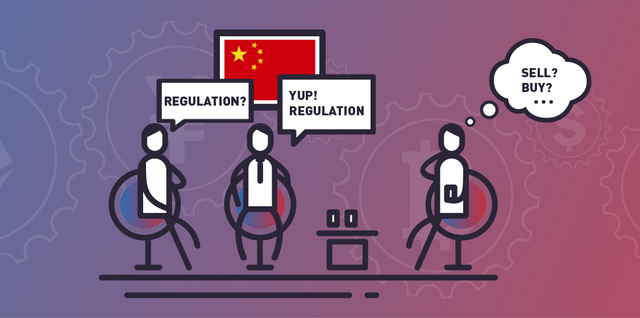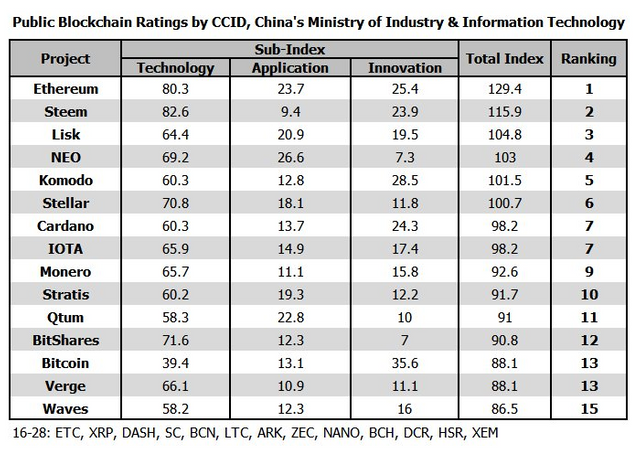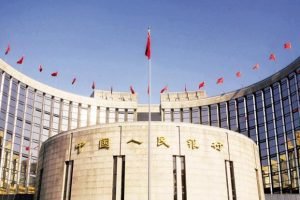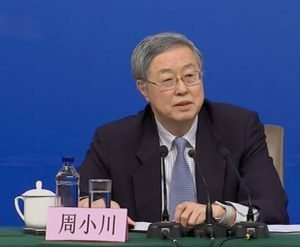China's State-Sponsored Research of the "Top 28" Could Be More Important Than You Think

The CCID Research Institute of the Ministry of Industry and Information Technology Ranks 28 Public Blockchains

Despite the ICO & fiat-to-cryptocurrency trading bans that China enforced late last year, it is apparent that the some factions of the Chinese government have a keen interest in blockchain technology and its potential uses cases. Last month the Ministry of Industry and Information Technology announced its intent to conduct a wide-scale study of 28 public blockchain projects, becoming the world's first government-funded ranking system.
The rankings were determined by an index of three categories: technology, application, and innovation. Ethereum ranked at number one with ease, with STEEM, Lisk, and China's own dearly loved project NEO lagging behind considerably at the two, three, and four spot. The entire rankings can be seen in the image on the left (courtesy of cnLedger). Steem taking the #2 spot was a surprise to many, which makes me wonder if they had accidentally switched the titles on Technology and Application (in my opinion Steem has great application but is not really technologically innovative). However, the purpose of this article is not to cause a debate on how they ranked these 28 projects.
Note: The following is purely an editorial piece based off speculation, and does not convey the official viewpoint or opinion of Lunar Digital Assets LLC as a company.
Could this be an indication that domestic trading will soon be resumed in China?
Divisions Within Nations Themselves
It seems that governments worldwide are struggling to find a regulatory solution to the cryptocurrency-trading and investing frenzy that caught the attention of the world last year. Different ministries and departments within a nation itself often have different opinions and motives-- causing more confusion and 'FUD'. A similar case can be found in South Korea when Hong Nam-ki, minister of the Office for Government Policy Coordination, denounced the Justice Ministry for releasing a misleading statement of intent to ban all cryptocurrency trading back in January. The public uproar was severe enough to warrant a video message recorded straight from the Presidential room at the Blue House (the Korean equivalent to the White House). Meanwhile, over here in the United States, a handful of government entities are in constant contradiction regarding the regulation of currencies: FinCEN defines them as currencies, the Treasury Department defines them as property, the CFTC wants to categorize them as commodities, while the SEC is clearly set on its mission to win its fight for jurisdiction by treating them as securities.Why Was a Study Conducted With Government Funds?
This study by the Chinese Ministry of Industry and Information Technology, could however, be a very good indication that the government is taking its next steps to lifting the ban on crypto-trading very seriously, and is very close to resuming its trade. Last July, Shanghai Daily reported that the People's Bank of China (PBoC) posted this peculiar job listing:
“The People’s Bank of China’s institute of printing science is offering six positions for the design and development of digital currency-related software and hardware framework, a recruitment notice said, adding that candidates with experience in blockchain and Big Data technologies will be preferred.
The candidates must hold master’s or doctoral degree in computer science, information security and cryptography, according to the notice.”
It is no secret that the Chinese government has been developing their own official cryptographically-backed currency. But let's take a deeper look into why China had banned cryptocurrency trading in the first place: limit illicit activities like tax evasion and money laundering, and protecting investors from fraudulent and risky projects. Are the stars lining up for you yet?
Chinese Exchanges Were Demanded Private Trading Volume Data and User Data Months Before The Trading Ban Announcement -- These Exchanges are Now Absolutely Thriving Overseas
Starting in January 2017, officials from PBoC visited the offices of the largest exchanges in China at the time, "politely requesting" (demanding) data and information on not only its trade activities but on their private users.
Robin Zhu, CEO of Huobi definitely thought something was up. To him, it seemed like the PBoC was gathering information in an order to create a framework for regulating the industry, something many exchanges wouldn't have necessarily been worried about.
The regulator wanted to grab a big picture of how significant cryptocurrency trading was in China - how does bitcoin work; where does the money come from; where does it go to; how do people make and lose money?
- Robin Zhu
The September 2017 trade-ban announcement came at a surprise to Zhu himself, along with the executives of other competing exchanges. With the ban in China ongoing, Chinese exchanges began their westward and eastward expansion, starting with the two of the top 10 largest exchanges by volume at the time: Huobi and OKCoin. In months offices were opened up in cryptocurrency safe-havens like Hong Kong, Singapore, and Belize. It didn't take long until Huobi Pro and OKEx once again took top 10 spots (OKEx and Huobi Pro stands at #1 and #3 in volume for the day at this time of writing). Binance, another Chinese-owned exchange formed amidst the trading-ban chaos, sits at the #2 spot and has seen an unprecedented rate of growth. Although Chinese fiat-to-crypto trading temporarily had investors shaken up, these "new" crypto-to-crypto trading exchanges have effectively taken the top 3 spots in volume.
An Official Digitized Chinese Currency & A List of Trusted Projects:
It is my speculation that this ban was placed with a plan in mind--a brilliant plan in which they devised to better monitor the transfer of fiat going in and out of the nation through cryptocurrencies. An official cryptocurrency backed by the Chinese government would have huge implications not only for China but for the entire world. Not only will it be the first global superpower to digitize its currency setting precedence for other nations to follow, but the China will have total control over the initial distribution and sales of these "RMB/CNY-Tether" type tokens, allowing them to chronologically track the movement of these assets with complete transparency. Instead of fighting blockchain technology, China plans to leverage it, as stated a couple months back on March 29th:
“[One objective] is to strictly strengthen internal management and external supervision, attach great importance to and effectively strengthen the quality control of RMB... and carry out rectification of various types of virtual currencies.” - Fan Yifei, Deputy Governor of the PBoC
It is very likely, in my opinion, that when the fiat-to-crypto trading ban is lifted China, these official government digital assets will be the only legal gateway to trade quasi "fiat"-to-crypto within its borders. In addition, this government-sponsored study of 28 public blockchain projects could possibly mean that the People's Bank of China is working with the Ministry of Industry and Information Technology to announce these government backed "fiat" tokens are ready to launch sooner than later, and ultimately allow domestic trading to resume with a list of whitelisted cryptocurrencies.
China's Domestic Trading Ban Cannot and Will Not Last Forever
I have personally been closely following the developments of the fiasco of the Chinese Cryptocurrency trading ban for over a year, and although I've had my suspicions about China's motives, I have kept it quiet. However, as more pieces to the puzzle begin lining up, I am convicted to share my speculations. A government like China does not waste its resources to sponsor and conduct random studies, and I believe that this CCID Research Institute of the Ministry of Industry and Information Technology is more significant than people think. However, I could be totally wrong, but I will not regret this piece because sometimes its fun to put on a tinfoil hat. As stated before, this is a personal editorial based off speculations.
Posted from: Lunar Digital Assets | Changing the world, one block at a time.


Hi! I am a robot. I just upvoted you! I found similar content that readers might be interested in:
https://lunardigitalassets.com/insights/speculation-opinions/2018/china-ranks-28-blockchain-cryptocurrencies/
Coins mentioned in post: